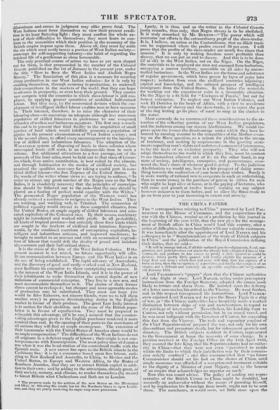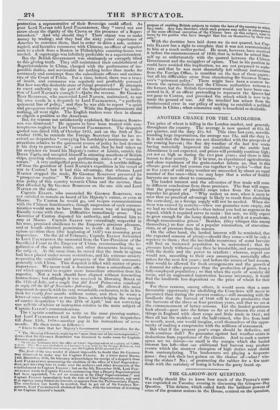THE CHINA PAPERS.
THE " correspondence relating to China" presented by Lord PAL- MERSTON to the louse of Commons, and the preparations for a war whh the Chinese, remind us of a prediction by this journal in the beginning of the year 1834, that the new plan for the manage- ment of British affairs in China would land this country, after a series of difficulties, in open hostilities with our valuable customers. It was immediately after the appointment of Lord NAPIER and his colleagues to be " Superintendents of the trade of British subjects in China" and the publication of the Royal Commission defining their duties, that we said- " 1t will be strange indeed, if all this national parade—diplomatic, fiscal, ma- gisterial, and judicial—does not alarm the already half affrighted Chinese Go- vernualit, and produce in due course as pretty a little quarrel as could he desired ; which pretty little quarrel will r‘mder eligible the prefience of a large fleet and army ; which fleet and army will find, first the capture of a town or two, then the occupation of a province, and the conquest of' an empire, not a (tumult and certainly an agreeable emiloyment.' —Spectator, 4th January 1534.
Lord PALMERSTON'S "papers" show that the Chinese authorities did take fright at once. Lord NAPIER, acting under peremptory instructions from the Foreign Secretary, adopted the course most likely to irritate and alarm them. Ile insisted upon the delivery of a letter announcing his arrival to the Viceroy. Ile went further, and in this respect transgressed his instructions. Lord PALMER STON enjoined Lord NAPIER not to pass the Bocce Tigris in a ship of war, as "the Chinese authorities have invariably made a marked distinction between ships of war and merchantmen, in regard to the privilege of intercourse." Nevertheless, his Lordship went to Canton, not only without permission. but in an armed vessel, and he was most indignant with the Governor of Canton,. for concealing this Ilia thoin the Viceroy. The rash and vapourmg conduct of the Chief Superintendent prepared the way. not only tor his own discomfiture and premature death, but for subsequent quarrels and disasters. The British subjects resident in Canton, represented to the Government at home the necessity of some change. In a petition received at the Foreign 011ice on the 18th April 1835, they assured the late King, that his Superintendents had no autho- rity in China—that they were not even "permitted to reside within the limits to which their jurisdiction was by their commis- sion strictly confined "; and they recommended that "no future Commissioner should set his foot. on the shores of China, until ample assurance was ntibrded of a reception and treatment suitable to the dignity of a Minister of your Majesty, and to the honour of an empire that acknowledges no superior on earth." Now this was sound advice. The policy of sending any repre- sentative of the British Crown to China might be doubtful, but assuredly an ambassador without the means of guarding himself, and by•implication his Sovereign from insult, ought not to be sent there. The merchants, it would seem, set little store upon the protection a representative of their Sovereign could afford. As poor Lord NAPIER told Lord PALMERSTON, they " cared not one straw about the dignity of the Crown or the presence of a Super-
intendent." And why should they ? Their object was to make money by trading ; and they had the sixty years' experience of America to convince them, that in order to drive a safe, uninter- rupted, and lucrative commerce with Chinese, no officer of superior rank to a clerk from a Boston br Philadelphia counting-house was needed. A supercargo was infinitely preferable to a superintendent. But the British Government was obstinately or corruptly blind to this glaring truth. They still maintained their establishment of Superintendents in China, charged with the performance of im- possible duties, and serviceable for nothing better than marks for contumely and contempt front the subordinate officers and emissa- ries of the Court of Pekin. For a time, indeed, there was a truce of insult, and commerce was regularly and profitably pursued.
But how was this desirable state of things preserved? By attempts to exert authority on the part of the Superintendents? by imita- tion of Lord NAPIER'S example?—Quite the reverse. Sir GEORGE BEST ROBINSON, who succeeded Lord NAPIER, maintained, to use his own words in a despatch to Lord PALMERSTON, "a perfectly quiescent line of policy," and thus he was able to report "a quiet and prosperous routine of trade." While the Superintendents did nothing, all went right. The English traders were then in almost as eligible a position as the American. But, for reasons not satisfactorily explained, Sir GEORGE ROBIN,. SON was dismissed.* He appears to have been treated with con- temptuous neglect by Lord Viscount PALMERSTON. The despatch
quoted was dated 16th of October 1835, and on the 28th of No- vember 1836, he reminds the Foreign Secretary that he has re- ceived no despatches "conveying his Lordship's sentiments or in- structions relative to the quiescent course of policy he had deemed it his duty to persevere in " ; and he adds, that he had taken up
his residence on board his Majesty's cutter at Linda, outside the Bocca Tigris, and occupied himself in attesting manifests of British ships, granting clearances, and performing duties of a "consular nature." A very undignified practice, no doubt. A terrible falling- off from the grandeur of Lord NAPIER'S expedition in his vessel of war to Canton! but it had this advantage, that whereas Lord NAPIER stopped the trade, Sir GEORGE ROBINSON preserved its "prosperous routine." We desire no better illustration of the true policy of this country towards China and the reverse, than that afibrded by Sir GEORGE ROBINSON on the one side and Lord :Kama on the other.
Captain ELLIOT, who succeeded Sir GEORGE ROBINSON, was not satisfied to remain on board of his Majesty's cutter, or even at
Macao. To Canton he would go, and reopen communications with the Chinese functionaries, though suspension of such commu- nication would seem to have been the surest way of keeping on friendly terms with them. Difficulties immediately arose. The Governor of Canton disputed his authority, and ordered him to stay at Macao. Captain ELLIOT was exceedingly respectful in his tone, promised obedience to the Emperor's gracious pleasure, and at length obtained permission to reside at Canton. The opium question then (the beginning of 1837) was assuming great
importance. On the 2d of February, Captain ELLIOT forwarded to Lord PALMERSTON the memorial from the Vice-President of the Sacrificial Court to the Emperor of China, recommending the le-
galization of the opium trade, and other documents bearing on the subject. At the same time, he stated that the trade in opium had been placed under severe restrictions, and his extreme anxiety respecting the condition and prospects of the British commerce generally with China. This despatch is filled with matter of grave importance. We never read a document from a subordinate offi- cer which appeared to require more immediate attention from his superior. Not a week should have elapsed without forwarding
instructions ; but although it was received in Downing Street on the 17th of July, not a single line did Lord Palmerston vouchsafe in reply till the 2d y'Nosemberfollowing, Ile allowed this most important despatch, with its Very remarkable enclosures, to lie in his desk tier yearly fists months without notice, and then he wrote a letter of some eighteen or twenty lines, acknowledging the receipt of sundry despatches "to the 27th of April," but not conveying one sylloble of advice or instruction relative to the main subject of Captain Essicsr's communications.
The Captain continued to write on the same pressing matter, but Lord Pi ssisawrox took no further notice of his despatches till June 15th, 1838—another gap in his instructions of seven months. lie then wrote as follows- " 1 have to state that her Majesty's Government cannot interfere for the The .1b,rning Chronicle, replying to " more than one of his contemporaries," denies that Sir GEORGE ROBINSON was dismissed to make room for Captain Etcorr, and adds- " :-Ur t 4.,1';.• ii011O1S011 held the office of Chief Superintendent at a salary of 0,000/. 31 year. The . dice was abalidied, nt.t because it was held by Sir George Robinson, but because O eonsidered annoessary: nor did Captain Elliot succeed to it."
The frcts of the case render it almost impossible to doubt that Sir GEORGE was dismi—ed to make way for Captain ELLIOT. In a letter dated Macao, 34.th December, 1536, Sir GEonct: acknowledges the receipt of a despatch from Lord PALMERSTON announcing the abolition of the office of Chief Superinten- dent, and directing him to make over the archives and other documents of the establishment to Captain ELLIOT ; but on the 8th November 1836, Lord PAL- EIERSTON wrote to Captain ELLtoT, announcing that a Deputy Superintendent tad been oppointed, "to act as assistant to the Chief Superintendent ;" and Captain Et.litirr immediately took the title of Chief Superintendent, and used it in signing many formal documents, us appears from the Parliamentary Papers. The conclusion can hardly be resisted, that to get rid of Sir GEORGE RO- BINSON, Lord PALMERSTON abolished the office, with the intention of restoring it for Captain ELLIOT'S benefit. purpose of enabling British subjects to violate the laws of the country to which they trade. Any loss, therefore, which such persons may suffer in consequence of the more effectual execution of the Chinese laws on this subject, must be borne by the parties who have brought that loss on themselves by their own acts."
With the doctrine here laid down we do not quarrel, but Cap- tain ELLIOT has a right to complain that it was not communicated to him at a much earlier period. He must, however, have received it before the commencement of 1839, that is, before he mixed him- self up so unfortunately with the quarrel between the Chinese Government and the smugglers of opium. That in his position he could have avoided this implication, we are not prepared to main- tain ; and that he was most shamefully left without instructions from the Foreign Office, is manifest on the thee of these papers : but all his difficulties arose from abandoning Sir GEORGE ROBIN. SON'S " quiescent policy." There might have been a contest be- tween the opium-dealers and the Chinese authorities ruinous to the former, but the British Government would not have been con- cerned in it, if an officer pretending to represent the Queen had not gone to Canton, and provoked the attack which is now to be made the ground of war. All the mischief has arisen from the fundamental error in our policy of seeking to establish a political position in China ; when commerce only is beneficial or desirable.



























 Previous page
Previous page